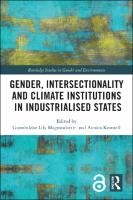Gender, Intersectionality and Climate Institutions in Industrialised States
| dc.contributor.editor | Magnusdottir, Gunnhildur Lily | |
| dc.contributor.editor | Kronsell, Annica | |
| dc.date.accessioned | 2021-04-20T08:10:31Z | |
| dc.date.available | 2021-04-20T08:10:31Z | |
| dc.date.issued | 2021 | |
| dc.identifier | ONIX_20210420_9781000397482_19 | |
| dc.identifier.uri | https://library.oapen.org/handle/20.500.12657/47887 | |
| dc.description.abstract | This book explores how climate institutions in industrialized countries work to further the recognition of social differences and integrate this understanding in climate policy making. With contributions from a range of expert scholars in the field, this volume investigates policy-making in climate institutions from the perspective of power as it relates to gender. It also considers other intersecting social factors at different levels of governance, from the global to the local level and extending into climate-relevant sectors. The authors argue that a focus on climate institutions is important since they not only develop strategies and policies, they also (re)produce power relations, promote specific norms and values, and distribute resources. The chapters throughout draw on examples from various institutions including national ministries, transport and waste management authorities, and local authorities, as well as the European Union and the UNFCCC regime. Overall, this book demonstrates how feminist institutionalist theory and intersectionality approaches can contribute to an increased understanding of power relations and social differences in climate policy-making and in climate-relevant sectors in industrialized states. In doing so, it highlights the challenges of path dependencies, but also reveals opportunities for advancing gender equality, equity, and social justice. Gender, Intersectionality and Climate Institutions in Industrialized States will be of great interest to students and scholars of climate politics, international relations, gender studies and policy studies. | |
| dc.language | English | |
| dc.relation.ispartofseries | Routledge Studies in Gender and Environments | |
| dc.subject.classification | thema EDItEUR::R Earth Sciences, Geography, Environment, Planning::RN The environment::RNP Pollution and threats to the environment::RNPG Climate change | en_US |
| dc.subject.classification | thema EDItEUR::J Society and Social Sciences::JB Society and culture: general::JBS Social groups, communities and identities::JBSF Gender studies, gender groups | en_US |
| dc.subject.classification | thema EDItEUR::R Earth Sciences, Geography, Environment, Planning::RN The environment::RND Environmental policy and protocols | en_US |
| dc.subject.other | Climate Institutions | |
| dc.subject.other | climate change | |
| dc.subject.other | climate policy | |
| dc.subject.other | environmental governance | |
| dc.subject.other | gender | |
| dc.subject.other | Intersectionality | |
| dc.title | Gender, Intersectionality and Climate Institutions in Industrialised States | |
| dc.type | book | |
| oapen.identifier.doi | 10.4324/9781003052821 | |
| oapen.relation.isPublishedBy | 7b3c7b10-5b1e-40b3-860e-c6dd5197f0bb | |
| oapen.relation.isbn | 9781000397482 | |
| oapen.relation.isbn | 9780367512057 | |
| oapen.relation.isbn | 9781003052821 | |
| oapen.relation.isbn | 9781032013701 | |
| oapen.imprint | Routledge | |
| oapen.pages | 278 | |
| peerreview.anonymity | Single-anonymised | |
| peerreview.id | bc80075c-96cc-4740-a9f3-a234bc2598f1 | |
| peerreview.open.review | No | |
| peerreview.publish.responsibility | Publisher | |
| peerreview.review.stage | Pre-publication | |
| peerreview.review.type | Proposal | |
| peerreview.reviewer.type | Internal editor | |
| peerreview.reviewer.type | External peer reviewer | |
| peerreview.title | Proposal review | |
| oapen.review.comments | Taylor & Francis open access titles are reviewed as a minimum at proposal stage by at least two external peer reviewers and an internal editor (additional reviews may be sought and additional content reviewed as required). |

